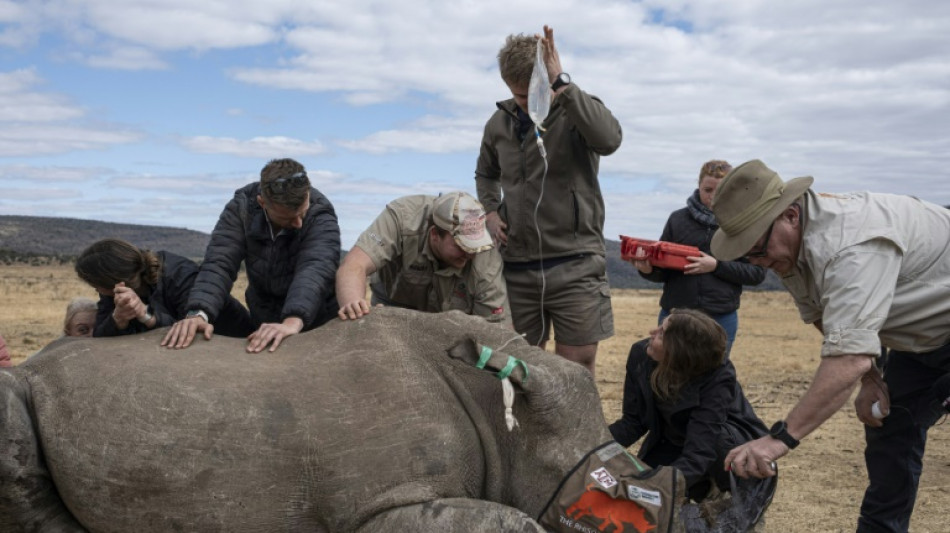
-
 Exec linked to Bangkok building collapse arrested
Exec linked to Bangkok building collapse arrested
-
Zelensky says Russian attacks ongoing despite Putin's Easter truce

-
 Vaibhav Suryavanshi: the 14-year-old whose IPL dream came true
Vaibhav Suryavanshi: the 14-year-old whose IPL dream came true
-
Six drowning deaths as huge waves hit Australian coast

-
 Ukrainian soldiers' lovers kept waiting as war drags on
Ukrainian soldiers' lovers kept waiting as war drags on
-
T'Wolves dominate Lakers, Nuggets edge Clippers as NBA playoffs start

-
 Taxes on super rich and tech giants stall under Trump
Taxes on super rich and tech giants stall under Trump
-
Star Wars series 'Andor' back for final season

-
 Neighbours improvise first aid for wounded in besieged Sudan city
Neighbours improvise first aid for wounded in besieged Sudan city
-
Tariffs could lift Boeing and Airbus plane prices even higher

-
 Analysts warn US could be handing chip market to China
Analysts warn US could be handing chip market to China
-
Unbeaten Miami edge Columbus in front of big MLS crowd in Cleveland

-
 Social media helps fuel growing 'sex tourism' in Japan
Social media helps fuel growing 'sex tourism' in Japan
-
'Pandora's box': alarm bells in Indonesia over rising military role

-
 Alaalatoa hails 'hustling hard' Brumbies for rare Super Rugby clean sheet
Alaalatoa hails 'hustling hard' Brumbies for rare Super Rugby clean sheet
-
Trio share lead at tight LA Championship

-
 Sampdoria fighting relegation disaster as old heroes ride into town
Sampdoria fighting relegation disaster as old heroes ride into town
-
Recovering pope expected to delight crowds at Easter Sunday mass

-
 Nuggets edge Clippers in NBA playoff overtime thriller, Knicks and Pacers win
Nuggets edge Clippers in NBA playoff overtime thriller, Knicks and Pacers win
-
Force skipper clueless about extra-time rules in pulsating Super Rugby draw

-
 Nuggets edge Clippers in NBA playoff overtime thriller, Pacers thump Bucks
Nuggets edge Clippers in NBA playoff overtime thriller, Pacers thump Bucks
-
Unbeaten Miami edge Columbus in front of big crowd in Cleveland

-
 Kim takes one-shot lead over Thomas, Novak at RBC Heritage
Kim takes one-shot lead over Thomas, Novak at RBC Heritage
-
Another round of anti-Trump protests hits US cities

-
 'So grateful' - Dodgers star Ohtani and wife welcome first child
'So grateful' - Dodgers star Ohtani and wife welcome first child
-
PSG maintain unbeaten Ligue 1 record, Marseille back up to second

-
 US, Iran report progress in nuclear talks, will meet again
US, Iran report progress in nuclear talks, will meet again
-
US Supreme Court intervenes to block Trump deportations

-
 Hamas armed wing says fate of US-Israeli captive unknown
Hamas armed wing says fate of US-Israeli captive unknown
-
Pacers thump Bucks to open NBA playoffs

-
 Sabalenka reaches Stuttgart semis as Ostapenko extends Swiatek mastery
Sabalenka reaches Stuttgart semis as Ostapenko extends Swiatek mastery
-
Zelensky says Ukraine will observe Putin's Easter truce but claims violations

-
 'Fuming' Watkins fires Villa in bid to prove Emery wrong
'Fuming' Watkins fires Villa in bid to prove Emery wrong
-
DR Congo boat fire toll revised down to 33

-
 England thrash Scotland to set up France Grand Slam showdown
England thrash Scotland to set up France Grand Slam showdown
-
Verstappen's Red Bull 'comes alive' to claim record pole in Jeddah

-
 McTominay fires Napoli level with Inter as Conte fuels exit rumours
McTominay fires Napoli level with Inter as Conte fuels exit rumours
-
Rajasthan unleash Suryavanshi, 14, as youngest IPL player but lose thriller

-
 Man City boost top five bid, Aston Villa thrash in-form Newcastle
Man City boost top five bid, Aston Villa thrash in-form Newcastle
-
Villa rout Newcastle to rekindle bid to reach Champions League

-
 Dumornay gives Lyon lead over Arsenal in Women's Champions League semis
Dumornay gives Lyon lead over Arsenal in Women's Champions League semis
-
Trans rights supporters rally in London, Edinburgh after landmark ruling

-
 'We have to wait': Barca's Flick on Lewandowski injury fear
'We have to wait': Barca's Flick on Lewandowski injury fear
-
Bordeaux-Begles backups edge Pau to close in on Top 14 summit

-
 Trans rights supporters rally outside in London, Edinburgh after landmark ruling
Trans rights supporters rally outside in London, Edinburgh after landmark ruling
-
PSG beat Le Havre to stay on course for unbeaten Ligue 1 season

-
 Man City close in on Champions League with Everton late show
Man City close in on Champions League with Everton late show
-
14-year-old Vaibhav Suryavanshi becomes youngest IPL player

-
 Barca make stunning comeback to beat Celta Vigo in Liga thriller
Barca make stunning comeback to beat Celta Vigo in Liga thriller
-
Zverev sets up birthday bash with Shelton in Munich


First radioactive rhino horns to curb poaching in S.Africa
South African scientists on Tuesday injected radioactive material into live rhino horns to make them easier to detect at border posts in a pioneering project aimed at curbing poaching.
The country is home to a large majority of the world's rhinos and as such is a hotspot for poaching driven by demand from Asia, where horns are used in traditional medicine for their supposed therapeutic effect.
At the Limpopo rhino orphanage in the Waterberg area, in the country's northeast, a few of the thick-skinned herbivores grazed in the low savannah.
James Larkin, director of the University of the Witwatersrand's radiation and health physics unit who spearheaded the initiative, told AFP he had put "two tiny little radioactive chips in the horn" as he administered the radioisotopes on one of the large animals' horns.
The radioactive material would "render the horn useless... essentially poisonous for human consumption" added Nithaya Chetty, professor and dean of science at the same university.
The dusty rhino, put to sleep and crouched on the ground, did not feel any pain, Larkin said.
The radioactive material's dose was so low it would not impact the animal's health or the environment in any way, he said.
In February the environment ministry said that, despite government efforts to tackle the illicit trade, 499 of the giant mammals were killed in 2023, mostly in state-run parks. This represents an 11 percent increase over the 2022 figures.
Twenty live rhinos in total would be part of the pilot Rhisotope project whereby they would be administered a dose "strong enough to set off detectors that are installed globally" at international border posts originally installed "to prevent nuclear terrorism", a pleased Larkin said, sporting a green hat and a khaki shirt.
Border agents often have handheld radiation detectors which can detect contraband in addition to thousands of radiation detectors installed at ports and airports, the scientists said.
-'Best idea'-
Rhino horns are highly sought after on black markets, where the price by weight rivals that of gold and cocaine.
According to Arrie Van Deventer, the orphanage's founder, dehorning the rhino and poisoning the horns have failed to deter poachers.
"Maybe this is the thing that will stop poaching", the tall, slim-built conservationist said. "This is the best idea I've ever heard".
Wildebeest, warthogs and giraffe roamed the vast conservation area as more than a dozen team members performed the delicate process on another rhino.
Larkin meticulously drilled a small hole into the horn, hammered in the radioisotope, then finished off by spraying 11,000 microdots all over the horn.
About 15,000 rhinos live in the southern African nation, according to an estimate by the international Rhino foundation.
The last phase of the project would be the animal's aftercare following "proper scientific protocol and ethical protocol", said the project's COO, a bubbly Jessica Babich.
The team would then take follow-up blood samples to ensure the rhinos were effectively protected.
The material would last five years on the horn, which was cheaper than dehorning every 18 months, Larkin said.
F.Bennett--AMWN



